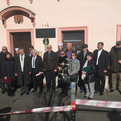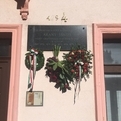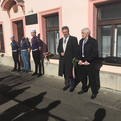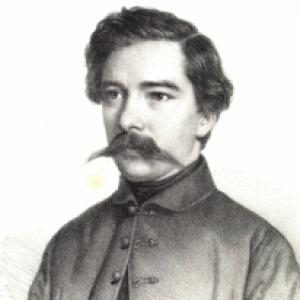Arany János emléktábla – Karlovy Vary



The history of the monument
János Arany Memorial Plaque - Karlovy Vary
The Czech Republic's best-known spa resort has been the destination of many Hungarians seeking a cure over the centuries. Perhaps the most famous of them was János Arany (1817-1882), who spent part of the summer here from 1869 for eight years to relieve his biliary problems. The greatest Hungarian epic poet seemed to have almost given up his literary activities due to his illness and the premature death of his daughter, Juliska, in 1865.
The 'Karlsbad cure', however, not only brought relief to Arany's physical ailments, but also renewed his interest in poetry. It was here that he wrote his short poem (in German) Motto, his poem to my wife, and translated Greek dramas in Karlovy Vary. The spirit of the place is evoked in The Love of Toldi, when King Charles IV of Bohemia (the spa's namesake) discovers the healing spring while hunting deer with his hunting companions, including Miklós Toldi.
Since 1957, a dark grey marble plaque on the house at 4 Zámecký vrch Street has commemorated the poet who once stayed there, 'the great admirer of Karlovy Vary'. Arany was the secretary general of the Hungarian Academy of Sciences from 1870 and, as a distinguished guest, the city authorities wanted to put him up in one of the city's upmarket hotels. But he remained faithful to the old house and the familiar, beloved neighbourhood.
Among other things, Arany sang of Karlsbad in his epic poem The Love of Toldi.
"But Charles loved the valley very much,
He'll think of a name for it afterwards:
He added to it the borders of two villages,
And where the hot water shoots its rays,
There he built a bath, and there he planted a town:
A meeting-place for all the world now.
Where the deer fell to the deep,
Where the bath was built above the spring,
Five hundred years after - or, yes, more,
A sickly grey man dreamed many a dream;
He blessed his waters for a great good,
If not for new life, for new hope of life,
And if ever this song can reach its goal:
He shall thank this spring's wondrous waters.''
János Arany Memorial Plaque - Karlovy Vary
The Czech Republic's best-known spa resort has been the destination of many Hungarians seeking a cure over the centuries. Perhaps the most famous of them was János Arany (1817-1882), who spent part of the summer here from 1869 for eight years to relieve his biliary problems. The greatest Hungarian epic poet seemed to have almost given up his literary activities due to his illness and the premature death of his daughter, Juliska, in 1865.
The 'Karlsbad cure', however, not only brought relief to Arany's physical ailments, but also renewed his interest in poetry. It was here that he wrote his short poem (in German) Motto, his poem to my wife, and translated Greek dramas in Karlovy Vary. The spirit of the place is evoked in The Love of Toldi, when King Charles IV of Bohemia (the spa's namesake) discovers the healing spring while hunting deer with his hunting companions, including Miklós Toldi.
Since 1957, a dark grey marble plaque on the house at 4 Zámecký vrch Street has commemorated the poet who once stayed there, 'the great admirer of Karlovy Vary'. Arany was the secretary general of the Hungarian Academy of Sciences from 1870 and, as a distinguished guest, the city authorities wanted to put him up in one of the city's upmarket hotels. But he remained faithful to the old house and the familiar, beloved neighbourhood.
Among other things, Arany sang of Karlsbad in his epic poem The Love of Toldi.
"But Charles loved the valley very much,
He'll think of a name for it afterwards:
He added to it the borders of two villages,
And where the hot water shoots its rays,
There he built a bath, and there he planted a town:
A meeting-place for all the world now.
Where the deer fell to the deep,
Where the bath was built above the spring,
Five hundred years after - or, yes, more,
A sickly grey man dreamed many a dream;
He blessed his waters for a great good,
If not for new life, for new hope of life,
And if ever this song can reach its goal:
He shall thank this spring's wondrous waters.''
Who we remember



























